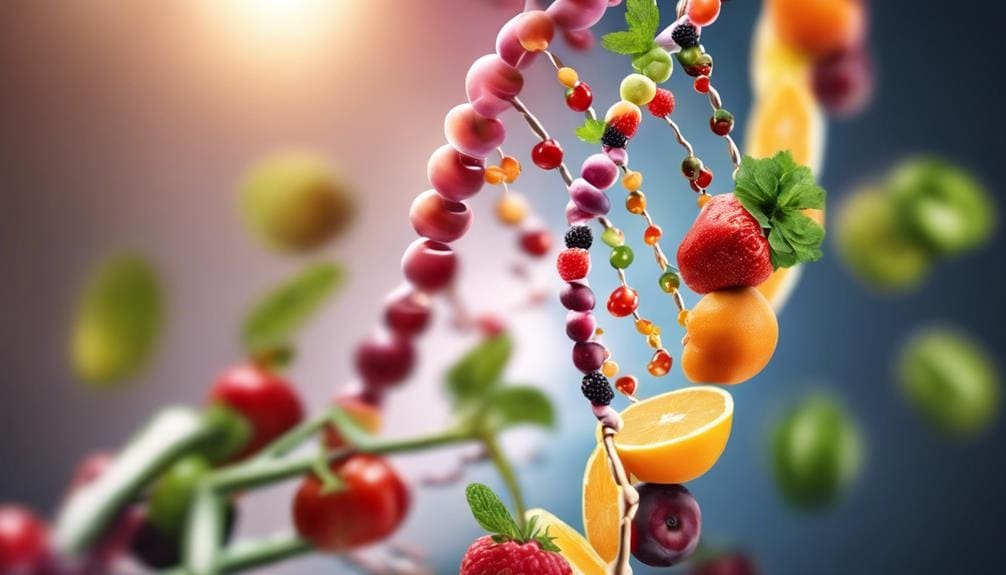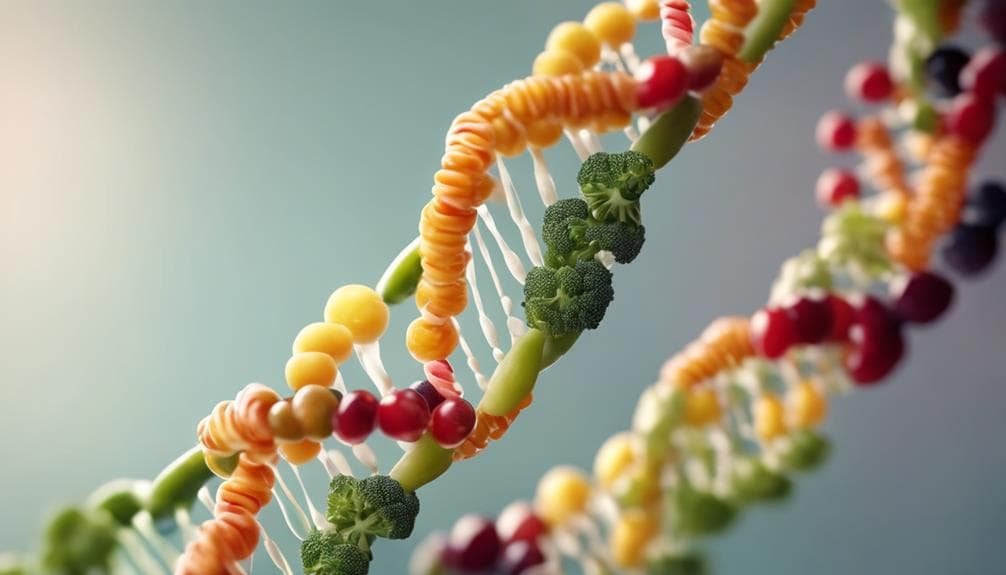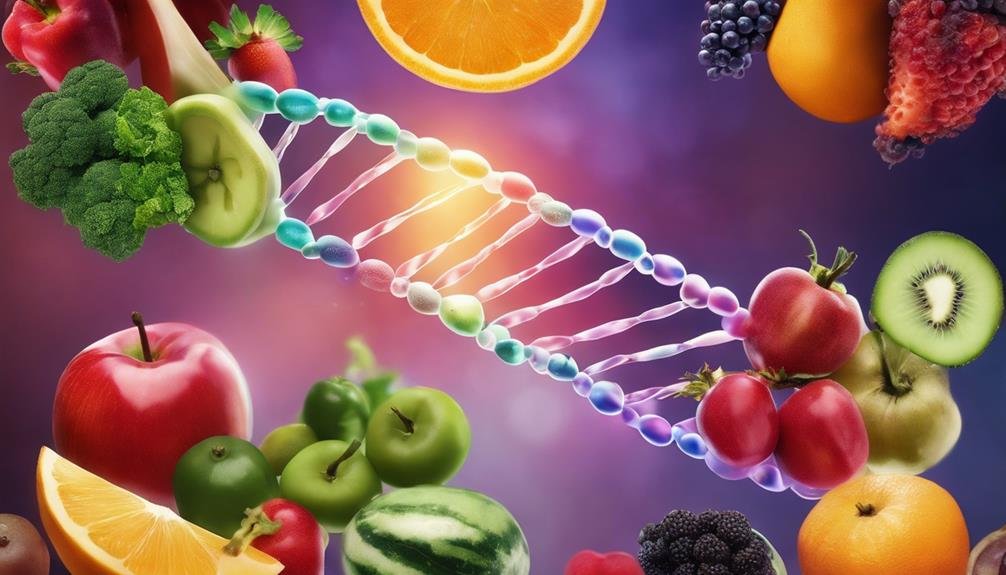Let's consider a scenario where a Nutrigenomics Report identifies a genetic predisposition to gluten sensitivity in an individual. This revelation prompts a reevaluation of their dietary choices and leads to significant improvements in their overall well-being.
The insights gained from such a report can be truly transformative, unlocking a deeper understanding of how our genes interact with the foods we consume. This intersection between genetics and nutrition holds immense potential for optimizing health outcomes and providing personalized solutions for individuals seeking to enhance their quality of life.
Key Concepts in Nutrigenomics
Key concepts in nutrigenomics provide essential insights into the intricate relationship between genetics and nutrition, shaping our understanding of how dietary components influence genetic expression. By delving into the interactions between DNA and nutrition, nutrigenomics offers the opportunity for personalized nutrition plans tailored to an individual's unique genetic makeup.
Understanding how genetic factors can impact digestion efficiency, macronutrient requirements, and weight management strategies is fundamental in the field of nutrigenomics. Through analyzing the way genes respond to different dietary components, we can optimize nutritional intake to match genetic predispositions. This personalized approach to nutrition takes into account an individual's genetic variations, ensuring that dietary recommendations are aligned with their specific genetic profile.
Nutrigenomics research not only aims to create personalized nutrition plans but also strives to prevent chronic diseases by identifying gene-diet interactions. By studying how epigenetic changes influenced by nutrients can affect genomic integrity, we emphasize the importance of maintaining a balanced diet to promote overall health and well-being. This deeper understanding of the interplay between genetics and nutrition highlights the significance of adopting a personalized approach to dietary recommendations based on an individual's DNA profile.
Benefits of Nutrigenomics Testing

Exploring the practical advantages of nutrigenomics testing reveals how personalized genetic insights can significantly enhance dietary recommendations and health outcomes. Nutrigenomics testing offers a comprehensive analysis of an individual's genetic susceptibility to various health conditions and how they interact with specific nutrients. By examining an individual's DNA report, healthcare providers can tailor nutrition plans to match the unique genetic profile of each patient. This personalized approach can lead to more effective dietary recommendations, weight management strategies, and overall health improvements.
The insights gained from nutrigenomic testing cover a wide range of factors, including digestion, diet type, macronutrient requirements, and weight loss factors. By understanding these genetic components, healthcare professionals can provide evidence-based recommendations that are specifically targeted to address an individual's genetic predispositions. This not only enhances patient consultations but also empowers individuals to make informed decisions about their health.
One notable example is the myDNA Comprehensive Health Report, which analyzes 92 genes to offer in-depth insights for both practitioners and patients. This detailed analysis provides a holistic view of an individual's genetic makeup, allowing for more personalized and effective interventions. Overall, nutrigenomics testing holds great promise in revolutionizing how we approach nutrition and healthcare by leveraging the power of genetic information to optimize health outcomes.
Personalized Nutrition Recommendations

Personalized nutrition recommendations based on nutrigenomic testing offer tailored dietary plans that align with an individual's unique genetic makeup, optimizing health outcomes. Nutrigenomic reports provide valuable insights into how our genes influence various aspects of our dietary needs and metabolism.
Here are four key points to consider when discussing personalized nutrition recommendations based on nutrigenomic testing:
- Customized Diet Plans: Nutrigenomic testing allows for the creation of personalized nutrition strategies that consider an individual's genetic predispositions. This personalized approach can help individuals make informed choices about their diet to support overall health and well-being.
- Optimizing Nutrient Absorption: By analyzing gene expression related to digestion and metabolism, nutrigenomic reports can provide guidance on enhancing nutrient absorption. This information can help individuals tailor their diet to ensure they're absorbing essential nutrients effectively.
- Targeted Interventions: Genetic data from nutrigenomics reports enables evidence-based consultations between practitioners and patients. This facilitates the development of targeted interventions that address specific genetic factors influencing diet, weight management, and overall health outcomes.
- Enhanced Health Outcomes: By incorporating personalized nutrition recommendations based on nutrigenomic testing, individuals can optimize their dietary choices to better suit their genetic makeup. This personalized approach has the potential to improve health outcomes and overall well-being by aligning diet with genetic factors.
Impact on Health and Well-being

Analyzing genetic variations through nutrigenomics reports illuminates the intricate connections between genetic makeup and its impact on health and well-being. By understanding how our DNA interacts with dietary components like fat, we can make more informed choices to enhance our overall health. The table below highlights some key insights gained from nutrigenomics reports regarding the impact on health and well-being:
| Genetic Insight | Impact on Health and Well-being |
|---|---|
| Variations in fat metabolism | Influence on cholesterol levels and predisposition to heart disease |
| Response to specific nutrients | Ability to absorb and utilize essential vitamins and minerals |
| Susceptibility to certain diseases | Risk factors for conditions such as obesity, diabetes, or cancer |
Nutrigenomics reports empower individuals to take charge of their health by providing personalized recommendations based on their genetic data. For example, if someone has a genetic predisposition for high cholesterol due to how their body metabolizes fats, they can adjust their diet to include healthier fats and monitor cholesterol levels more closely. Understanding how our genetic makeup influences our response to nutrients and disease risk allows for tailored dietary choices that can lead to better health outcomes. By leveraging the insights from nutrigenomics reports, individuals can proactively manage their well-being through personalized nutrition strategies.
Future of Nutrigenomics

As we look ahead to the future of nutrigenomics, advancements in understanding diet-gene interactions continue to drive research towards unraveling the complexities of genetic influences on chronic diseases. Our understanding of how genetic makeup interacts with dietary components to either promote health or contribute to disease risk is expanding rapidly.
To navigate this complex landscape, we must consider several key factors:
- Integration of Highly Controlled Genotypes and Environments: Incorporating highly controlled genotypes and environmental conditions in studies is crucial for accurate interpretations of diet-gene interactions.
- Addressing Challenges in Prediction: The challenges in predicting diet-gene interactions underscore the intricate nature of nutrigenomics, emphasizing the necessity for large-scale projects to further our knowledge.
- Focus on SNP-Diet and SNP-Nutrient Interactions: Research is honing in on identifying specific gene variants (SNPs) that interact with diets and nutrients, shedding light on the genetic underpinnings of chronic diseases.
- Public Health Priorities: Prioritizing the study of micronutrient requirements based on individual genetic makeup can aid in preventing and treating deficiencies, contributing to improved public health outcomes.
Frequently Asked Questions
Can Nutrigenomics Testing Accurately Predict Future Health Conditions?
Yes, genetic predisposition influences health outcomes. Predictive accuracy of nutrigenomics testing guides personalized nutrition choices to mitigate risks. Understanding genetic markers helps proactively manage health. Tailored approaches enhance well-being and prevent disease effectively.
How Does Nutrigenomics Testing Account for Lifestyle Factors in Personalized Nutrition Recommendations?
Genetic variations and lifestyle factors are considered in personalized nutrition recommendations. Lifestyle habits like exercise, stress, and sleep quality are analyzed to tailor diet plans for optimal health outcomes. This integration enhances precision and effectiveness.
Are There Any Potential Risks or Drawbacks Associated With Nutrigenomics Testing?
Potential risks and drawbacks of nutrigenomics testing include inaccurate predictions, overlooking lifestyle factors, affecting athletic performance, and limited affordability access. It's crucial to consider these factors when interpreting genetic data for personalized nutrition recommendations.
Can Nutrigenomics Testing Help to Improve Athletic Performance and Recovery?
Yes, nutrigenomics testing can help improve athletic performance and recovery by tailoring dietary supplements based on genetics. Understanding how genes influence exercise performance allows for personalized nutrition plans, optimizing recovery and enhancing athletic capabilities.
How Accessible and Affordable Is Nutrigenomics Testing for the General Population?
Cost concerns and accessibility challenges impact nutrigenomics testing for the general population. Affordable gene analysis, like blood type analysis for free, provides personalized insights on nutrition and genetics, aiding in better understanding for individuals.
Conclusion
In conclusion, the nutrigenomics report offers valuable insights into our genetic predispositions towards nutrition and health. By understanding our unique genetic makeup, we can tailor personalized nutrition plans to optimize our well-being and overall health outcomes.
As the saying goes, 'knowledge is power,' and with this knowledge, we can make informed decisions to improve our health and quality of life. Embracing nutrigenomics testing can pave the way for a healthier future for all of us.
